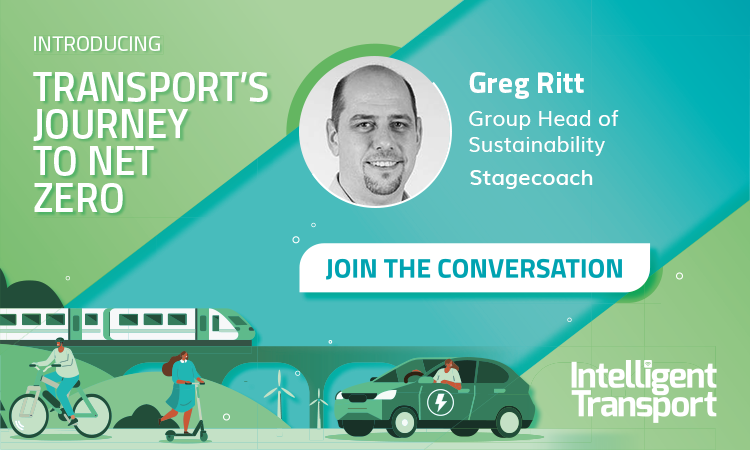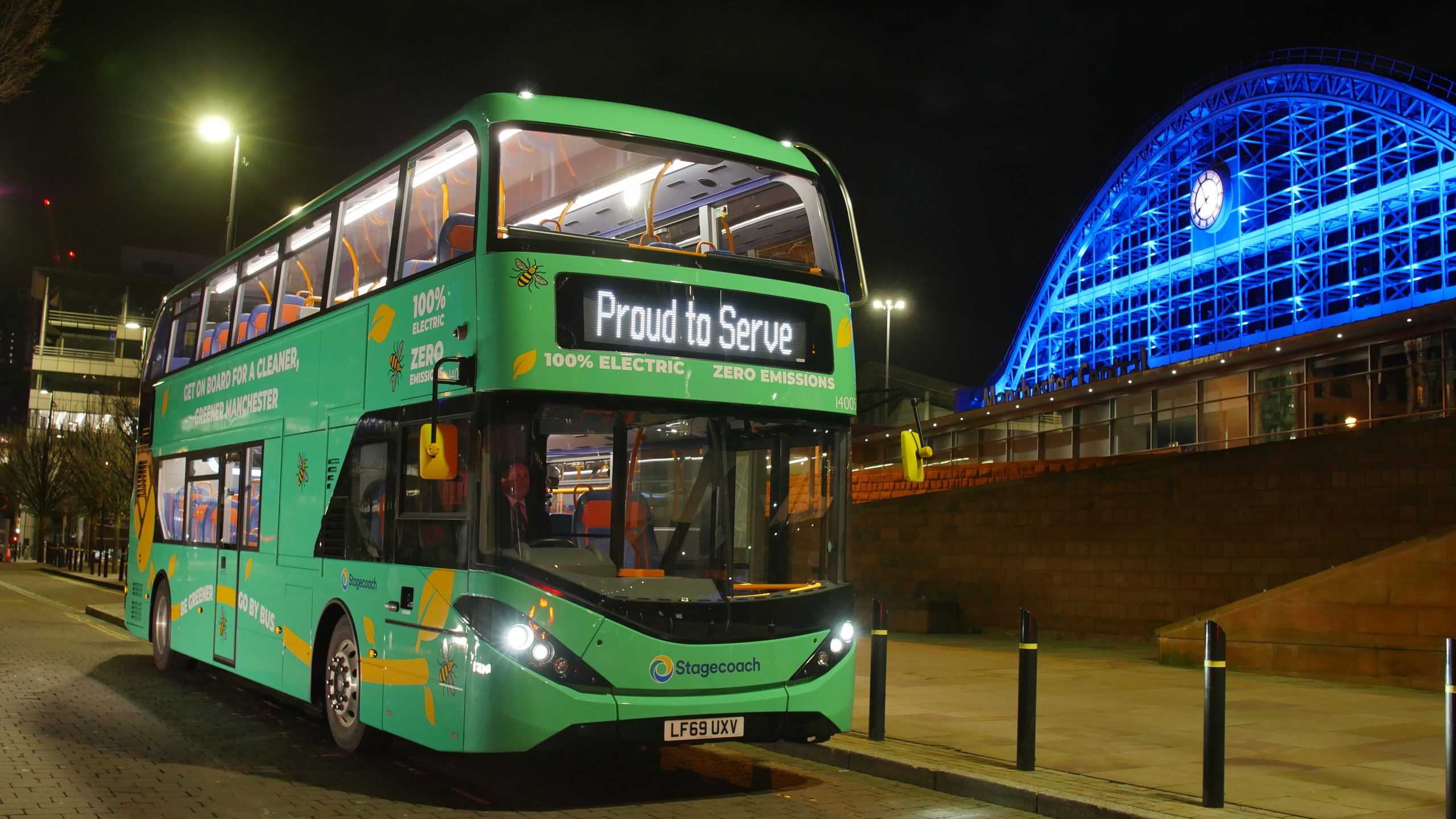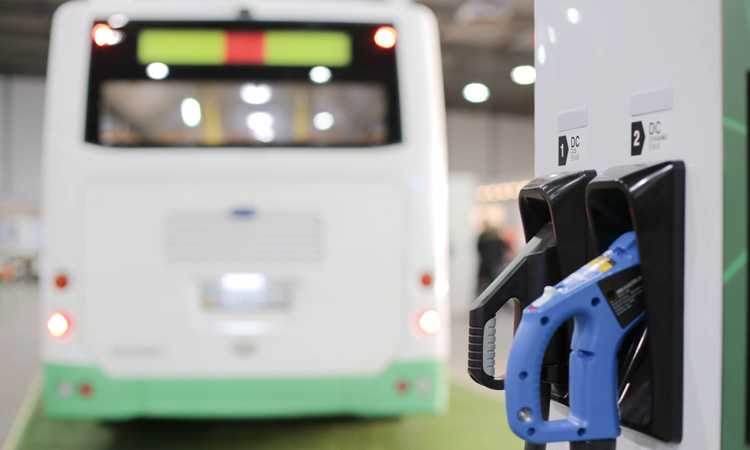Transport’s journey to net zero: Zero-emission buses are vital to decarbonising our industry, says Stagecoach
- Like
- Digg
- Del
- Tumblr
- VKontakte
- Buffer
- Love This
- Odnoklassniki
- Meneame
- Blogger
- Amazon
- Yahoo Mail
- Gmail
- AOL
- Newsvine
- HackerNews
- Evernote
- MySpace
- Mail.ru
- Viadeo
- Line
- Comments
- Yummly
- SMS
- Viber
- Telegram
- Subscribe
- Skype
- Facebook Messenger
- Kakao
- LiveJournal
- Yammer
- Edgar
- Fintel
- Mix
- Instapaper
- Copy Link
Posted: 27 October 2022 | Greg Ritt - Stagecoach | No comments yet
For the latest instalment of Intelligent Transport’s exclusive sustainable mobility Q&A series, Greg Ritt, Group Head of Sustainability at Stagecoach, discusses the importance of accelerating the transition to zero-emission buses in order to reduce the industry’s carbon emissions, and highlights the challenges that often accompany this, as well as the need for targeted funding from local and national governments to support the wider adoption of renewable energy.


The ever-pressing challenges of poor air quality and traffic congestion have been a key focus for the transport industry, as operators and authorities strive to achieve their net zero targets. How big a part does the decarbonisation of public transport play in reducing the UK’s carbon emissions?
The only way that the country is going to achieve all of its carbon targets is with a tight focus on encouraging individuals from cars and onto public and active transport”
Public transport is fundamental in reducing the UK’s carbon emissions. The only way that the country is going to achieve all of its carbon targets is with a tight focus on encouraging individuals from cars and onto public and active transport. Operators need to work with national and local governments in the immediate short-term to push this modal shift. We are committed to achieving a zero-emission UK bus fleet by 2035, but there also needs to be more funding available to increase zero-emission vehicle adoption across the country. Bus and coach travel is one of the most carbon efficient modes of passenger road transport and has many other benefits, such as cost savings compared to car ownership and social interactions. As the transition to zero-emission buses accelerates, we have the opportunity to reduce emissions even faster.
What are the immediate challenges that Stagecoach Group is facing in decarbonising its public transport fleet?
There are some great opportunities ahead, with a huge prize to be gained at the end from moving people out of cars and onto lower carbon forms of transport. As with any opportunity, though, comes challenge, and these are around the availability of zero-emission buses (ZEBs), including infrastructure, the uptake of modal shift and ensuring that all relevant sector stakeholders – national and devolved governments, local authorities, bus operators and the supply chain – work collaboratively towards a transition and common net zero future within the timeframe that has been set by the Paris Agreement, which is the legally binding international treaty on climate change.


Credit: Stagecoach
What projects does Stagecoach Group currently have in the pipeline that will help to achieve a more sustainable transport system in the UK?
We have a target of achieving a UK zero-emission bus fleet by 2035″
Sustainable transport is one of our key objectives over the coming years. The main objective is transitioning to zero-emission buses, and we have a target of achieving a UK zero-emission bus fleet by 2035. This includes the procurement and installation of zero-emission buses, as well as the improvement of supporting infrastructure in our depots. As a group, most of our emissions come from our vehicles.
At the same time, we are focusing on reducing the consumption of resources and the efficient use of them. We procure 100 per cent renewable electricity and have programmes currently underway to reduce the amount of energy that we use – through the installation of low energy consuming lights at depots, for example. Although depots are a small producer of emissions, particularly compared to diesel bus use, we know that every effort will contribute to positive change.
Although public transport has seen a global increase in ridership post-pandemic, car use continues to be more resilient. What is being done to encourage modal shift from the private car, and how significant is improving active travel and public transport infrastructure in achieving this?
Stagecoach has some of the UK’s lowest bus and coach fares in the UK and, with the current cost-of-living-crisis, we know that keeping fares as low as we can will benefit our customers, community and the environment. In March 2022, we released our zero-emission bus report, which has given us fantastic insights and enabled several recommendations to be formed around the move to zero-emission buses.
With the current cost-of-living-crisis, we know that keeping fares as low as we can will benefit both our customers, community and the environment”
We will continue working tirelessly towards a culture-wide modal shift; however, even with the work that we, government and other operators are doing, this will be dependent on us collectively taking the right approach. There are major risks to bus usage if we don’t get it right. Passengers have said loud and clear that, while they support zero-emission buses, this can’t be at the expense of the core reasons that they use the vehicle. Passengers need to have confidence that electric or hydrogen buses can perform just as well as diesel buses: that they can be frequent, punctual and reliable. Most importantly, our research has identified that passengers need this to happen without a major increase in fares. Passengers expect the transition to ZEBs to be challenging, and for passenger fares to rise as a result. But they are also clear that, while they expect this to be the case, this isn’t something that they can or will easily tolerate.

How big a contribution must Stagecoach make in order for the UK to meet its climate goals?
We must engage with government and communities to continuously build and provide confidence in zero emissions buses”
We have our goal of achieving a zero-emission bus fleet in the UK by 2035 and becoming a net zero business by 2050. These are must haves. Without a doubt, we must commit 100 per cent of our effort to achieve these ambitions. Although we know this cannot be done in a polarised way, we must engage with government and communities to continuously build and provide confidence in zero-emission buses – electric or hydrogen – so that society, as a whole, can see that this technology can perform just as well as diesel buses; that they can be frequent, punctual and reliable.
In an ideal world, what would a net zero transport system look like to you?
In a perfect world, a net zero transport system would have a fast roll-out, with all stakeholders fully embracing the urgency; we don’t have the luxury of time”
In a perfect world, a net zero transport system would have a fast roll-out, with all stakeholders fully embracing the urgency; we don’t have the luxury of time. A holistic net zero transport system will be one built with a holistic view, embracing sustainability in its widest sense; it will be built on partnerships, supportive policy and targeted funding from governments at national and local level; and it will be one that rewards businesses and citizens who do the right thing. It will also need social change, individually in how we live, work and travel, changing our behaviour as well as the technology we use. Finally, an ideal world will be one that has alignment with and supportive measures by partners in our supply chain, as well as other stakeholders. This will help ensure that we are moving forward through a fair, just transition.


Related topics
Air Quality, Alternative Power, Fleet Management & Maintenance, Mobility Services, Passenger Experience, Public Transport, Sustainable Urban Transport, Transport’s Journey to Net Zero Series
Related modes
Bus & Coach
Related countries
United Kingdom
Related organisations
Stagecoach, UK Government
Related people
Greg Ritt







